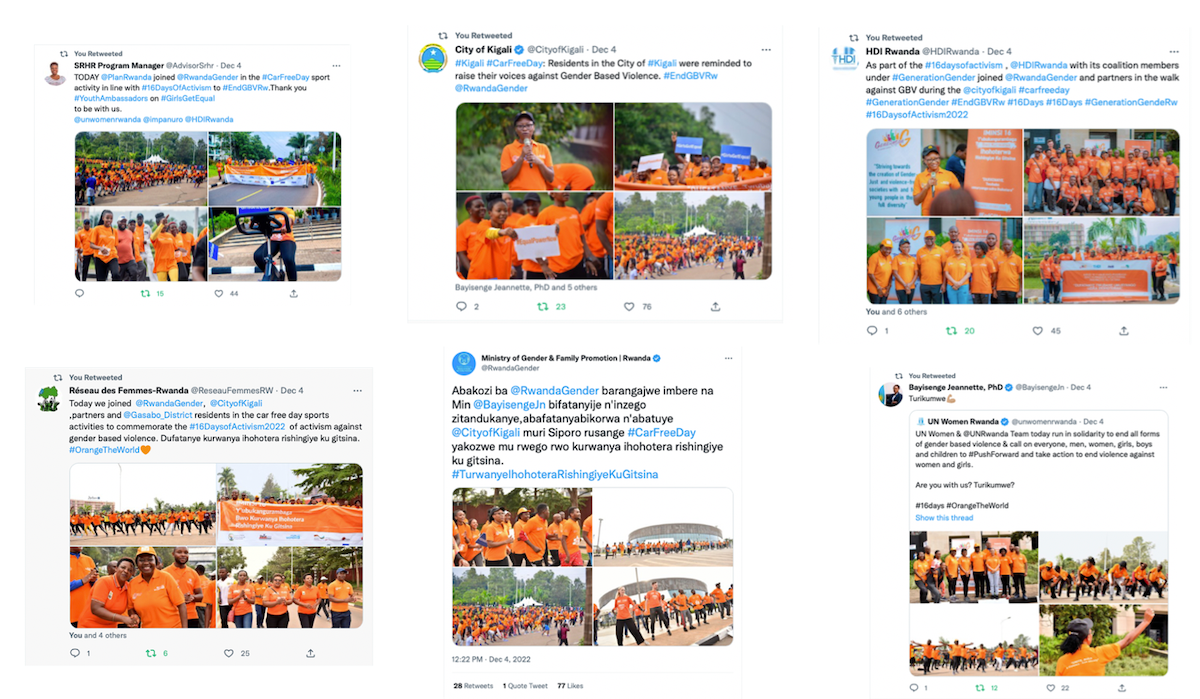UN system and partners in Rwanda join the government to commemorate the 16 Days of Activism against Gender-Based Violence campaign
Date:
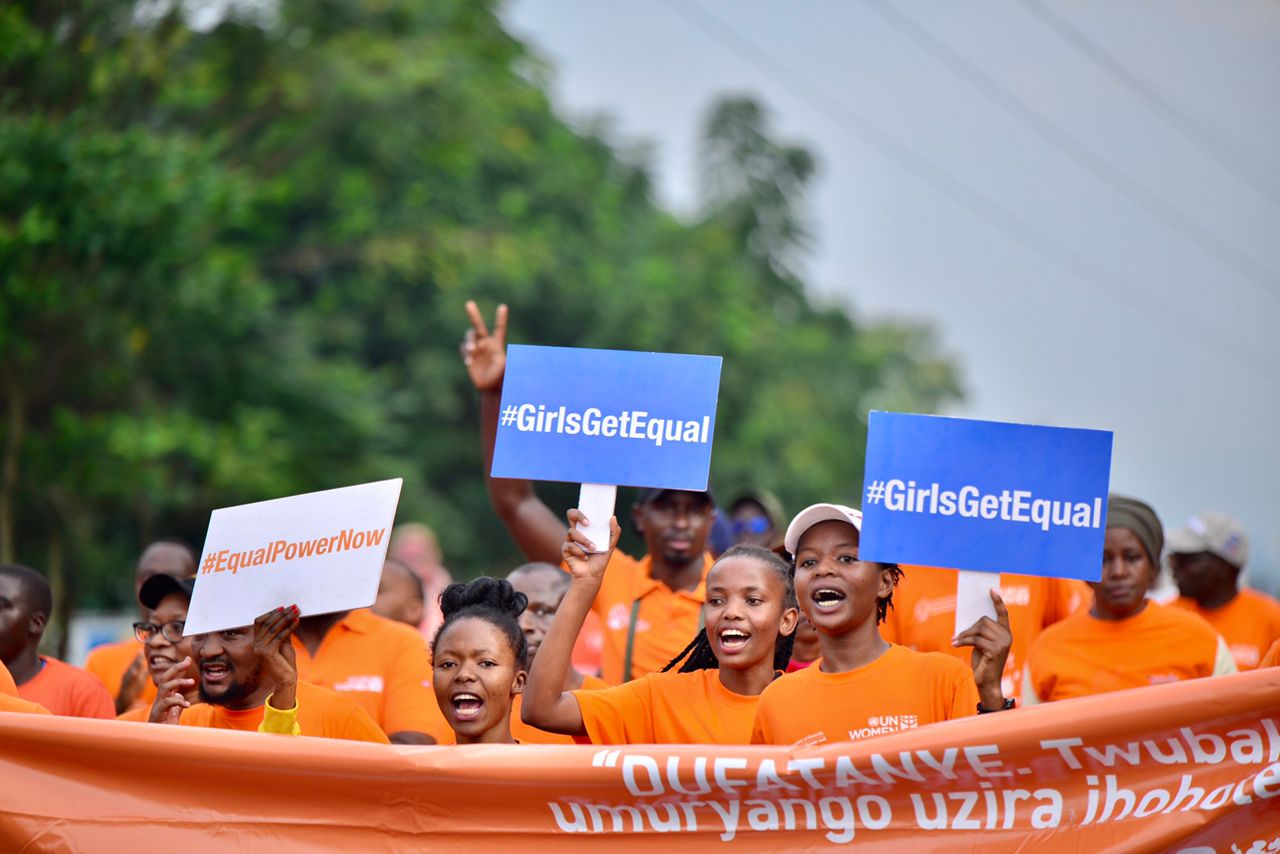
On 25 November, UN Women Rwanda joined the Government of Rwanda, led by the Ministry of Gender and Family Promotion together with partners and residents of Kagano sector for the official launch of 16 Days of Activism against Gender-Based Violence 2022 in Nyamasheke District, Western Province of Rwanda.
This year’s celebration was under the global theme “UNITE! Activism to end violence against women and girls”, customized at the national level as “#UNITE! Build a Violence-Free Society”, translated to DUFATANYE. Twubake Umuryango Uzira Ihohoterwa” in Kinyarwanda. Both themes invited everyone to play their role in ending violence against women and girls and show support and solidarity towards uprooting this scourge for the good of families and societies at large.
The 16 Days of Activism against Gender-Based Violence is an international civil society-led campaign every year starting with the International Day for the Elimination of Violence against Women on 25 November, and ends on 10 December, Human Rights Day, indicating that violence against women is the most pervasive breach of human rights worldwide.
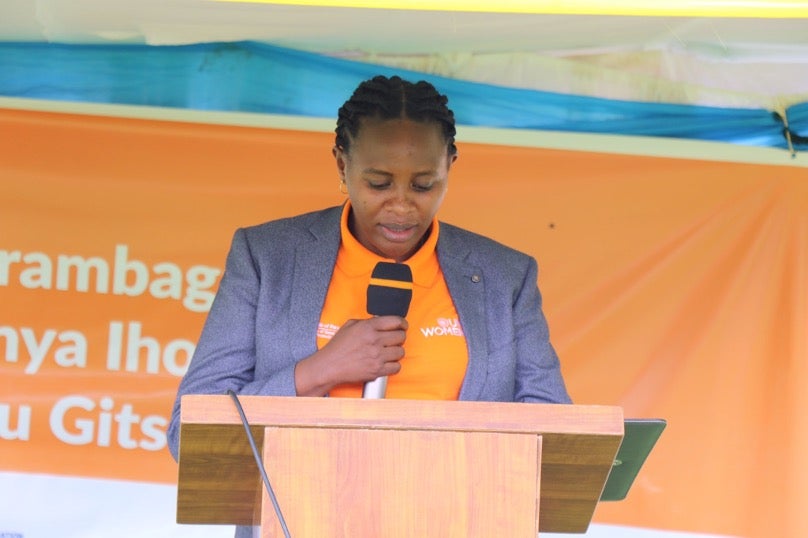
Welcoming all delegates and residents, the Mayor of Nyamasheke district Ms. Mukamasabo Appolonie thanked the Ministry of Gender and Family Promotion for selecting Nyamasheke for the celebration of the launch of the 16 days of activism, saying that it is an opportunity for awareness raising for residents on their individual role in fighting against the culture of silence on gender-based violence issues especially on teen pregnancy and child defilement.
“Parents should endeavor to have time for their children and educate them about sexual and reproductive health and rights and avoid as much as possible family conflicts including GBV because they are among the factors increasing the incidences of GBV,” she added.

Speaking as the guest of honor at the launch, Prof. Jeannette Bayisenge, Minister of Gender and Family Promotion said that it is paramount to recognize the power of family members - father, mother and children - working together and investing in constructing a safe and resilient family that is free from GBV.
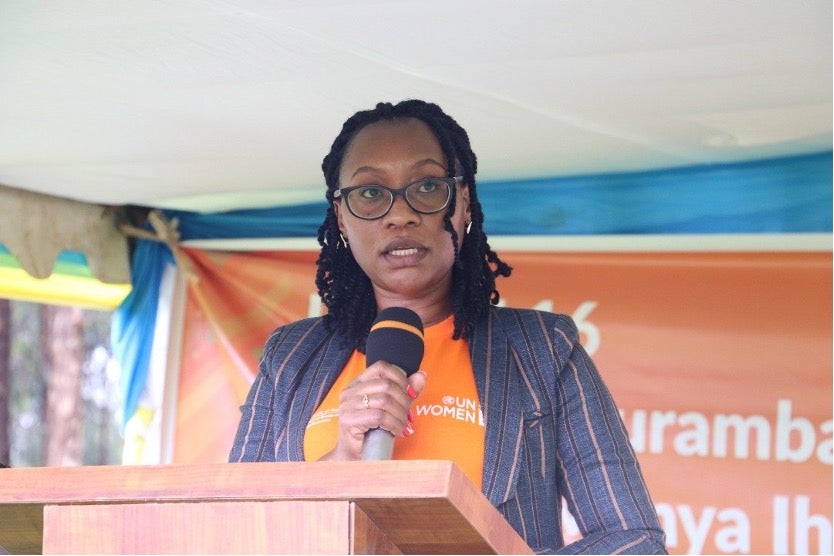
“16days of activism is a good time to think about the measures put in place to prevent, and to help the survivors get full help and also to think about new measures that will help us find a lasting solution to eradicate violence, especially against women and girls,” Minister Bayisenge added.
Prof. Bayisenge retaliated that GBV is one of the main problems that still exist in society and threatens human rights, security and development of the country. “Over the past 3 years, we have seen an increase in the number of people seeking help for abuse, both at the doctor’s office, at the Isange One Stop Center, at police stations and elsewhere. This shows us that people now know their rights, and survivors are increasingly coming out to report cases which is a good thing however, some cases go unreported,” Minister Bayisenge added.
Hon. Jeannette recognized the critical role of Isange One Stop Center (IOSC) in providing services that support survivors of violence and mobilize the public and the community to understand their contribution in combating GBV, defilement and reduction of teenage pregnancy. She pointed out that GBV acts are categorized as crimes punishable under the law because they undermine the dignity and humanity of a person and erodes national values and such cases are becoming more prevalent, where parents abuse their own children, and spouses are not afraid to fight and inflict pain on each other.
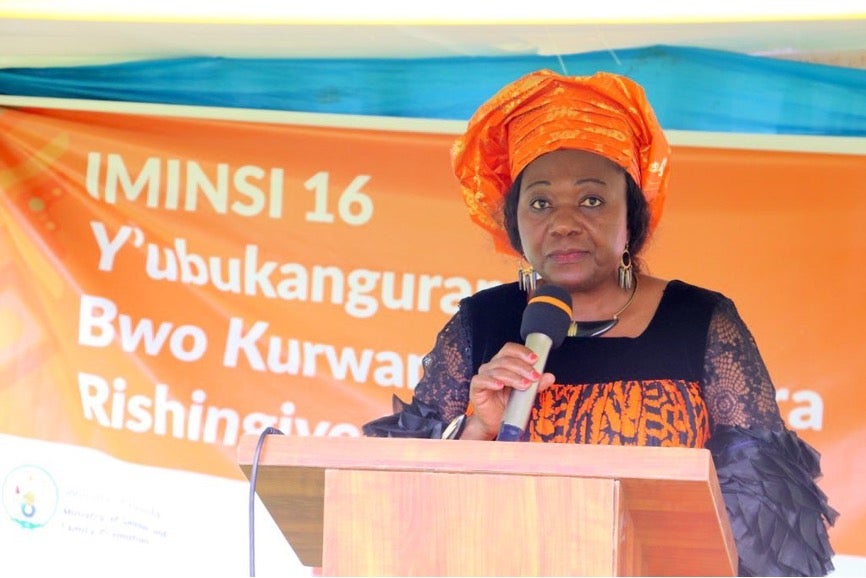
Madam Jennet Kem, UN Women's Country Representative in Rwanda, speaking on behalf of the One UN in Rwanda and the UN Resident Coordinator Mr. Ozonia Ojielo said that ending violence against women might seem unimaginable, but it is not. "Ending violence against women and girls can be achieved through partnerships and advocacy, coupled with coordinated action or services across different sectors such as justice, health, and education among others.” she said.
She added that Rwanda's Isange One Stop Centers are glowing examples of how resources and services merge to end violence against women. Unfortunately, despite all efforts, GBV persists and is increasing in some cases. In Rwanda, from available statistics, there has been an increase in teen pregnancies (from 2nd to 4th grade), which translates to more young mothers who need support from their communities. The Rwanda Investigation Bureau confirmed an increase of reported cases from 4194 cases in 2017 to 14,987 cases in 2021, meaning 3.6 times increase in just four years.
Ms. Kem pointed out that a recent study by UN Women and UNODC showed that five women/girls are killed every hour worldwide in the hands of close relations, adding that despite immense efforts, violence against women remains one of the most pervasive forms of human rights abuse.
Ms. Kem said that marking the day in Nyamasheke, a rural district in western Rwanda, provided an opportunity to learn about the status of women in rural parts of the country where violence against women remains prevalent.
During the 16days national launch in Nyamasheke district, 107 couples from three sectors of Kagano, Kanjongo and Bushekeri legalized their marriages, a move which builds trust between couples and reduces family conflicts including violence.
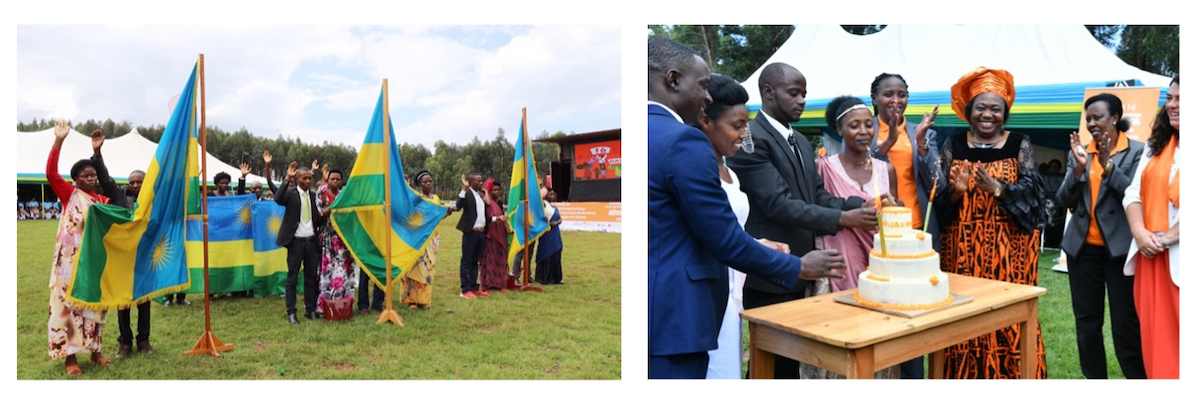
In addition, the official launch provided a platform to raise awareness on prevention of gender-based violence against women and girls through a drama series on existing negative social norms, which enlightened participants on different forms of violence in families while tasking community members to take responsibility of reporting GBV and becoming their neighbor’s keepers.
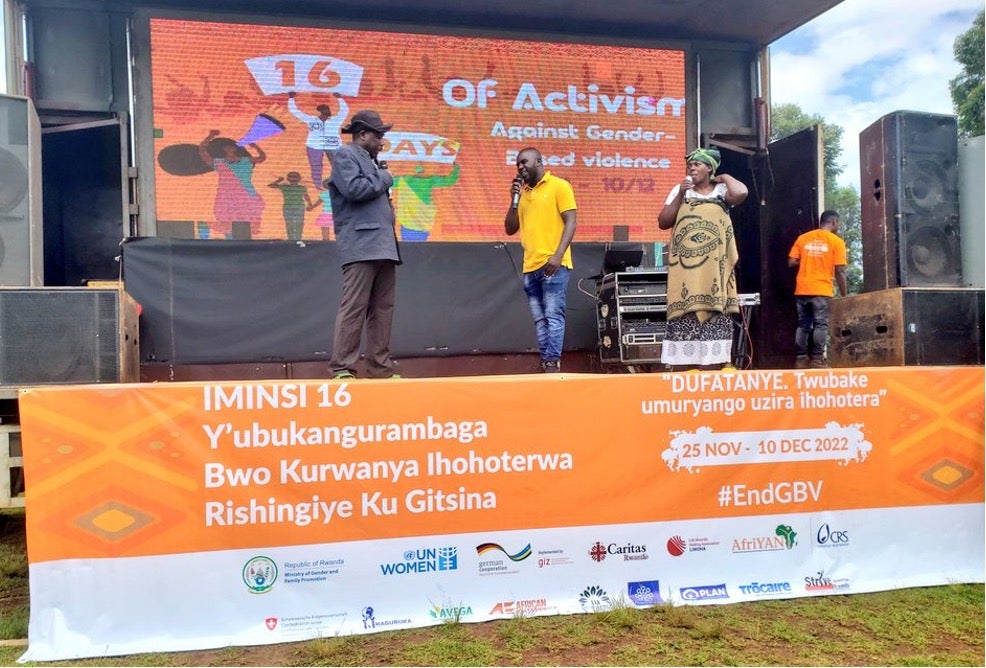
Madam Kem Jennet appreciated the Government of Rwanda for its leadership and unwavering commitment to ending violence against women and girls, promoting gender equality and women empowerment across the board and commended all partners including the European Union, Swiss Agency for Development and Cooperation for rallying behind UN Women with resources. Sheconcluded by appreciating community members for the backed up evidence through testimonies and educative drama series and thanking relevant stakeholders including CSOs, women movements, activists, men engage initiatives, and the media for supporting the cause for ending VAWG as it requires multisectoral partnerships.
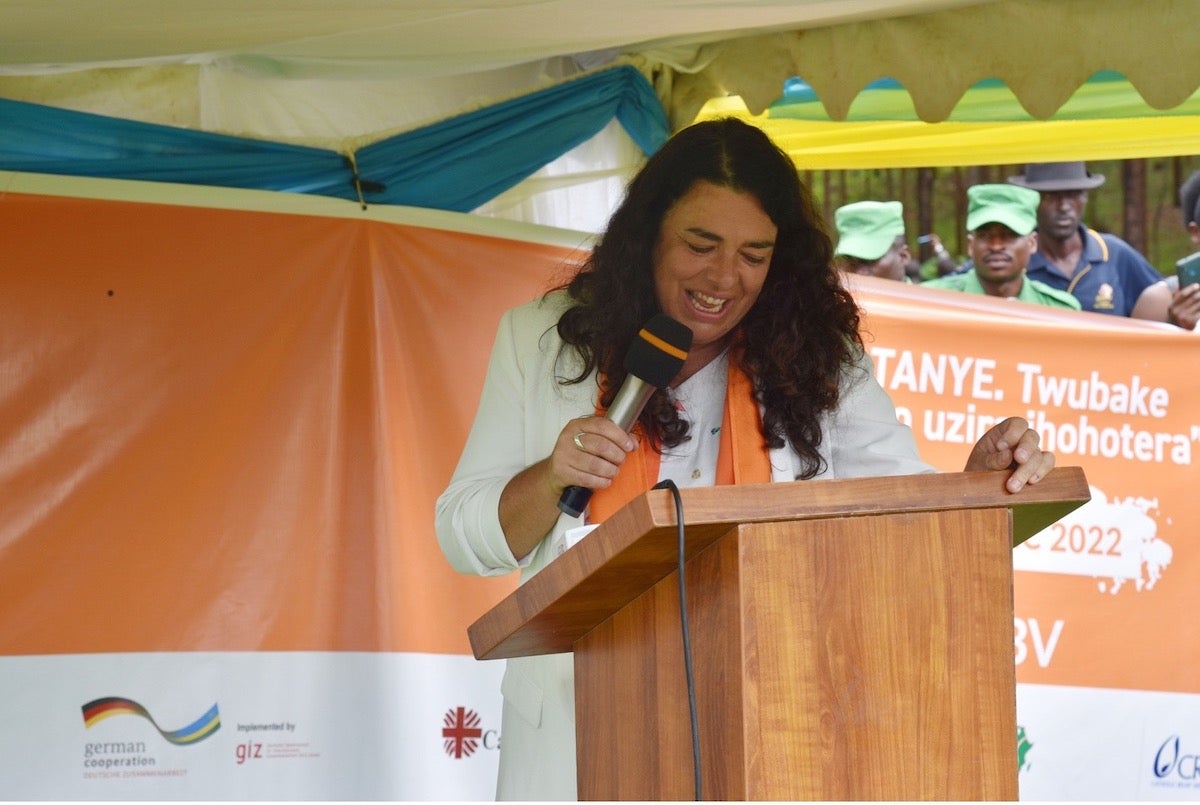
The European Union Ambassador, H.E Belen Calvo Uyarra, recommitted European Union’s support in ending violence against women and girls, saying that EU strongly condemns gender-based violence and stands in solidarity with UN Women and the Government of Rwanda.
The European Union Ambassador, H.E Belen Calvo Uyarra, recommitted European Union’s support in ending violence against women and girls, saying that EU strongly condemns gender-based violence and stands in solidarity with UN Women and the Government of Rwanda.
Consultative and policy dialogue on GBV Prevention and Response in Rwanda: From Policy to Practice
In the continuation of 16 days of activism awareness raising campaign, UN Women Rwanda in collaboration with the Rwanda Bar Association (RBA) organised a two-day consultative and policy dialogue on GBV Prevention and Response forum from 1st to 2nd December 2022 to share experiences, and good practices, but also challenges and recommendations for policy makers’ deliberations and decisions. The dialogue brought together different key stakeholders working in the area of gender equality, and prevention and response to GBV including Government institutions such as the Ministry of Gender and Family Promotion, Rwanda Investigation Bureau, National Public Prosecution Authority, Ministry of Justice, Ministry of Education, Rwanda Biomedical Centre, Gender Monitoring Office, Rwanda Correctional Service, National Police, UN agencies, the Rwanda Bar Association and its members, CSOs, media practitioners among others.
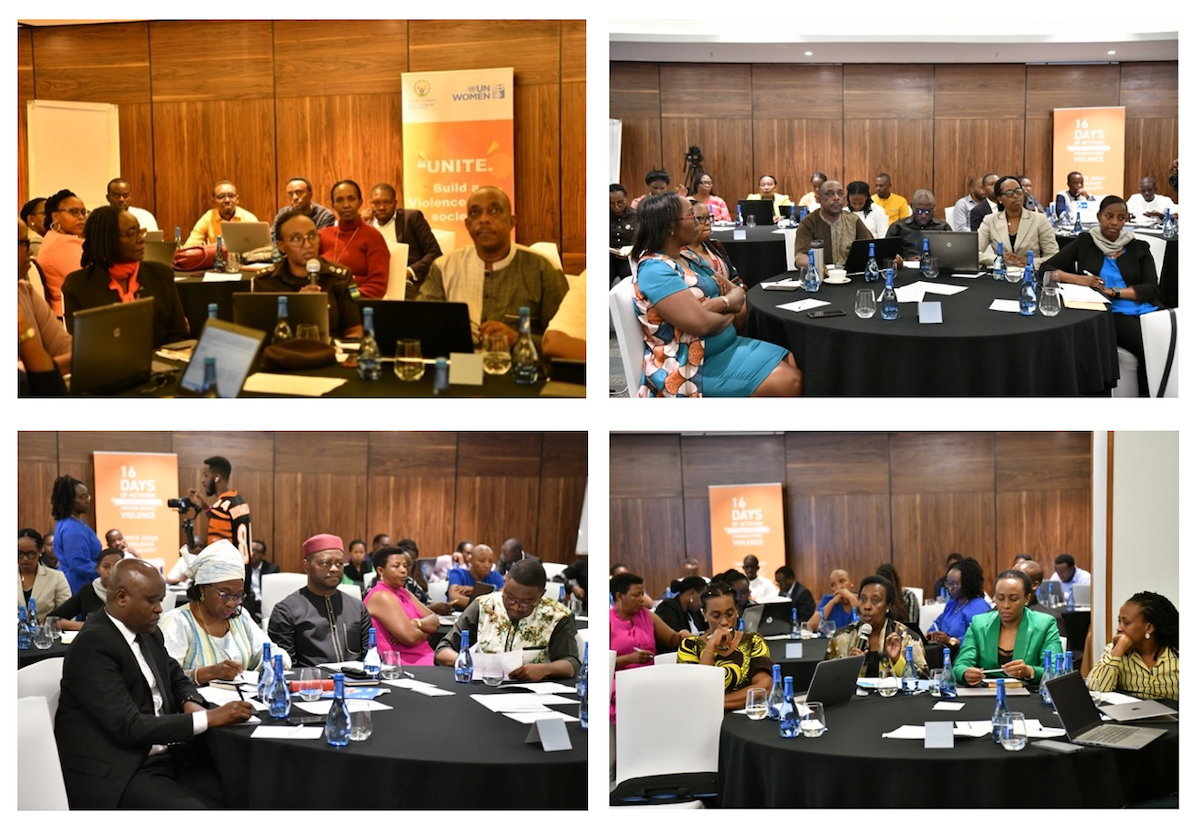
The first day convened technical staff from different institutions, as well as representatives from the local community, to brainstorm and understand the status of GBV, show existing loopholes, improve understanding of GBV-related issues, and suggest recommendations to address GBV adequately and holistically in Rwanda.
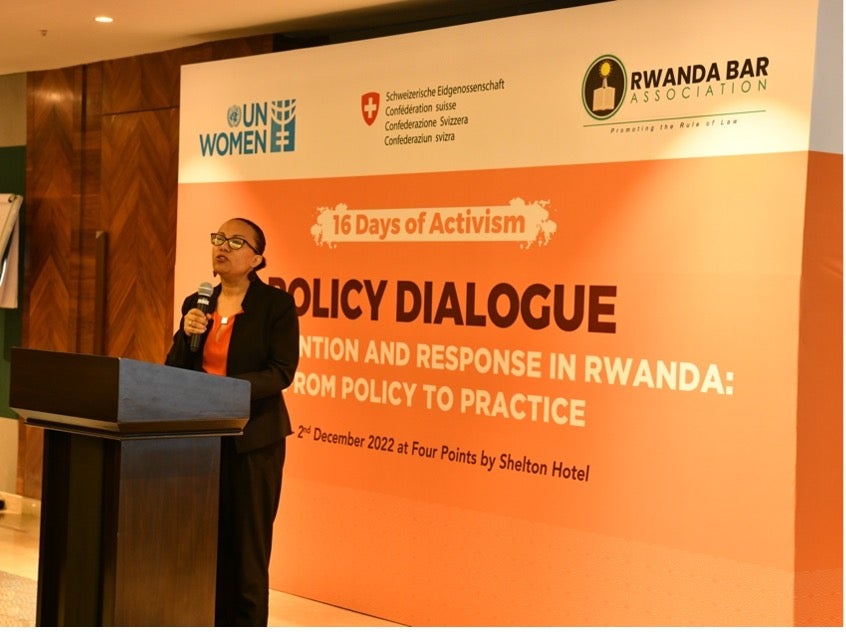
Opening the policy dialogue, UN Women’s Program Management Specialist Ms. Tikikel Tadele called for a holistic approach to end gender-based violence through coordination, but also leveraging on cooperative advantages and on each other’s expertise in positioning the way we work in addressing prevention and response for GBV. “The unfinished agenda demands from us all to advocate for an end to stereotypes that perpetuate the culture of violence full access to justice, investment in prevention and provisions of services to survivors and reinvigorate multi-partner collaboration.” Ms. Tadele said.
The findings from day one informed the discussions of the high-level dialogue on day two which led to deliberations and commitments to key actionable priorities for ending gender-based violence in Rwanda.
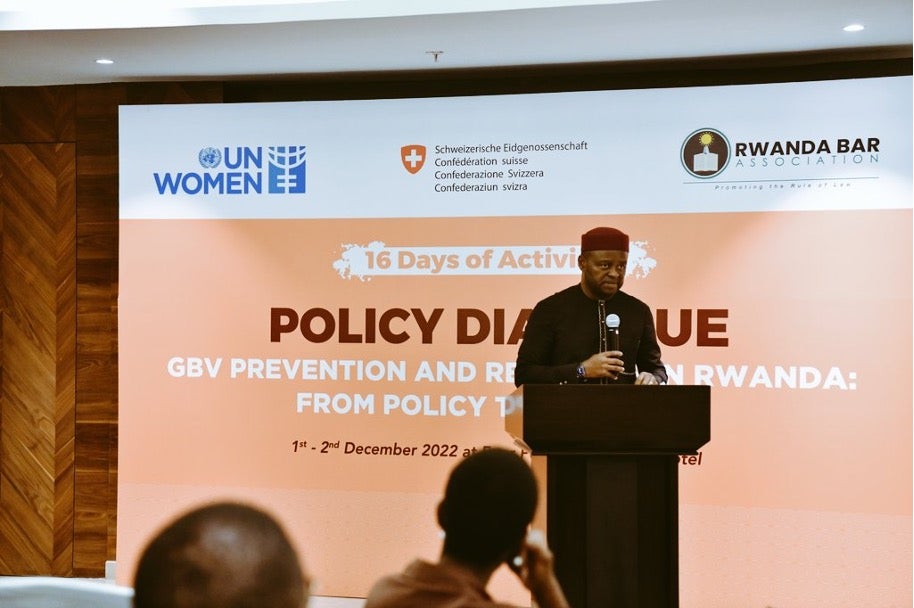
Speaking at the policy dialogue, Mr. Ozonnia Ojielo, UN Rwanda Resident Coordinator reiterated that GBV is a symptom of asymmetrical power relations grounded in misogyny, patriarchy and negative social norms and stereotypes and eliminating GBV requires holistic, comprehensive, and multi-stakeholder approaches including strong voices and actions from both women and men.
"Men should be frontline leaders in ending gender-based violence," Mr. Ozonnia said. "That way, there will be a transformation in gender equality and social norms." he added
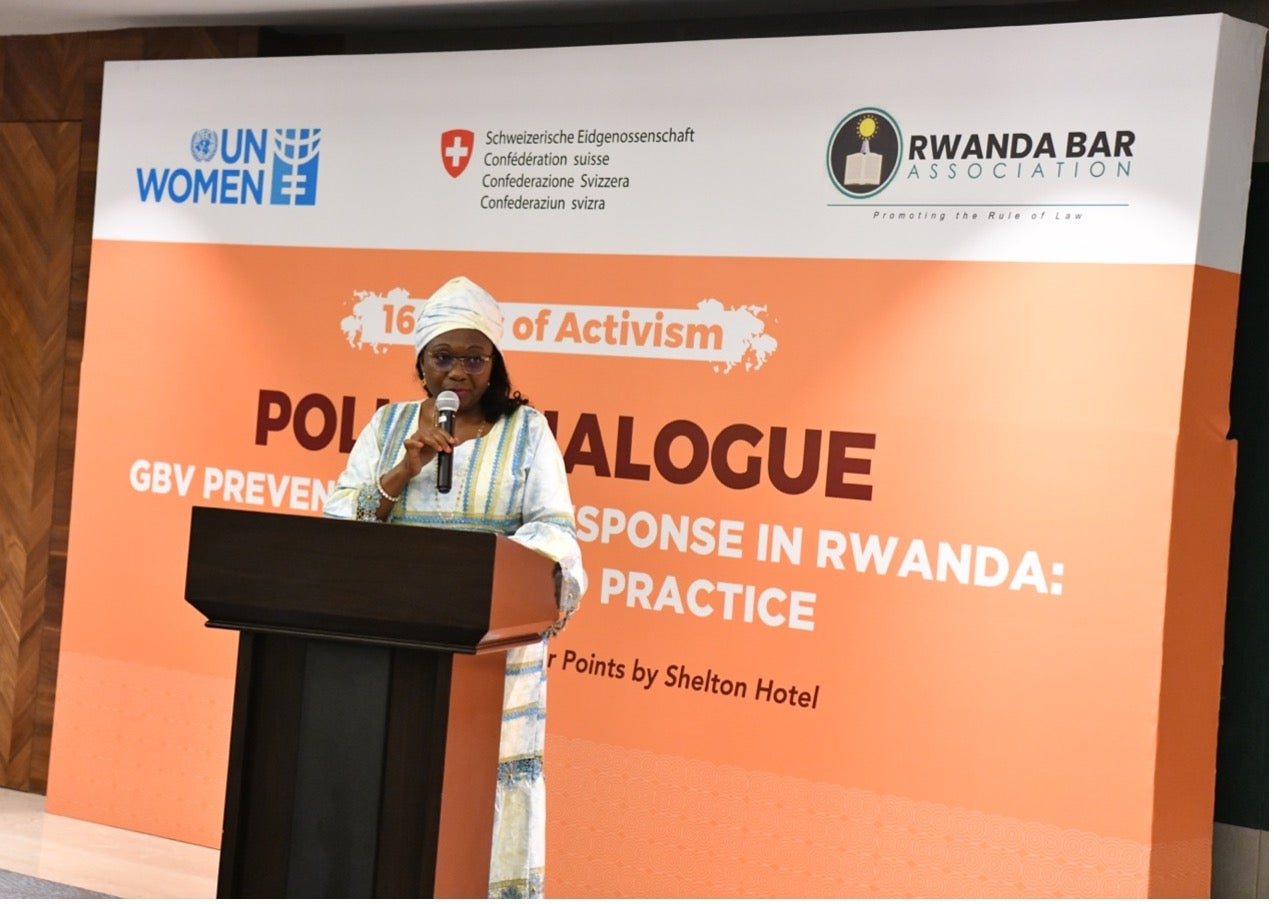
The UN Women Country Representative, Madam Jennet Kem, noted that Rwanda has made tremendous strides in improving the lives of women and girls, but much more still needs to be done. In particular, she noted that partnerships, particularly with the Rwanda Bar Association on legal assistance to GBV victims across the country and calls for action to increase awareness, galvanize advocacy efforts, share knowledge and innovations but also commit and conjugate efforts to end violence against women and girls as well as building stronger and more resilient societies.
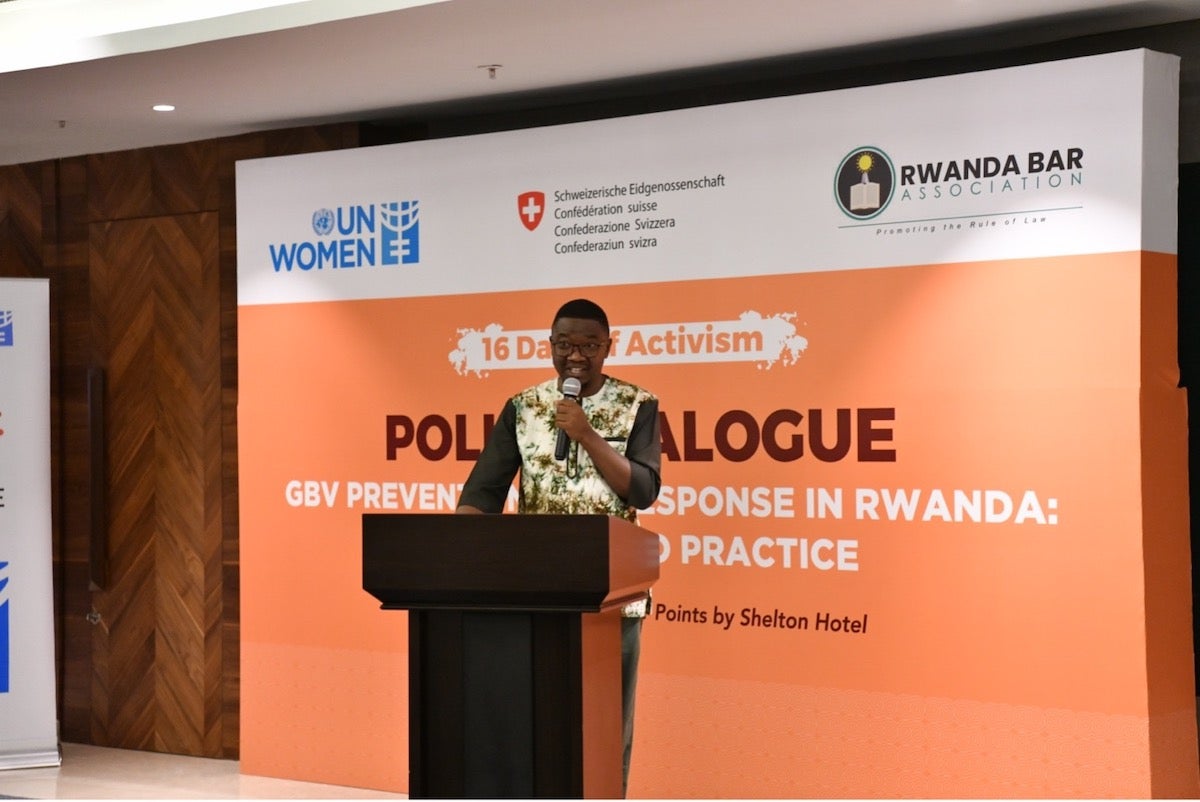
Speaking on behalf of the Minister of Gender and Family Promotion, Mr. Silas Ngayaboshya said that GBV undermines the health, dignity, security and autonomy of its victims, yet it remains shrouded in a culture of silence. In the context of Rwanda, a legal reform has been made as embarked by the constitution of the republic of Rwanda of 2003 revised in 2015 which enshrines the principles of gender equality and women’s rights. Mr. Ngayaboshya reiterated that the government and its partners have deployed considerable efforts to address GBV challenges and some commendable successes have been registered including engaging men and boys in advocacy and awareness raising and use of gender transformative approaches to gender mainstreaming.
16Days of Activism Against Gender Based Violence ‘Car-Free Day Sports’ Activities
On 4th December 2022, the UN Women Rwanda Team joined Kigali City residents in a ‘Car-Free Day Sports’ activity organized by the Ministry of Gender and Family Promotion in collaboration with the city of Kigali with UN Women’s financial and technical support. The event raised awareness on GBV Prevention and response through mass sports with the participants dressed in orange, the theme color of the 16 days campaign. The solidarity run, attended by different key stakeholders including government officials, UN, CSOs, Kigali communities, called on everyone, men, women, girls, boys and children to #PushForward and take action to end violence against women and girls.
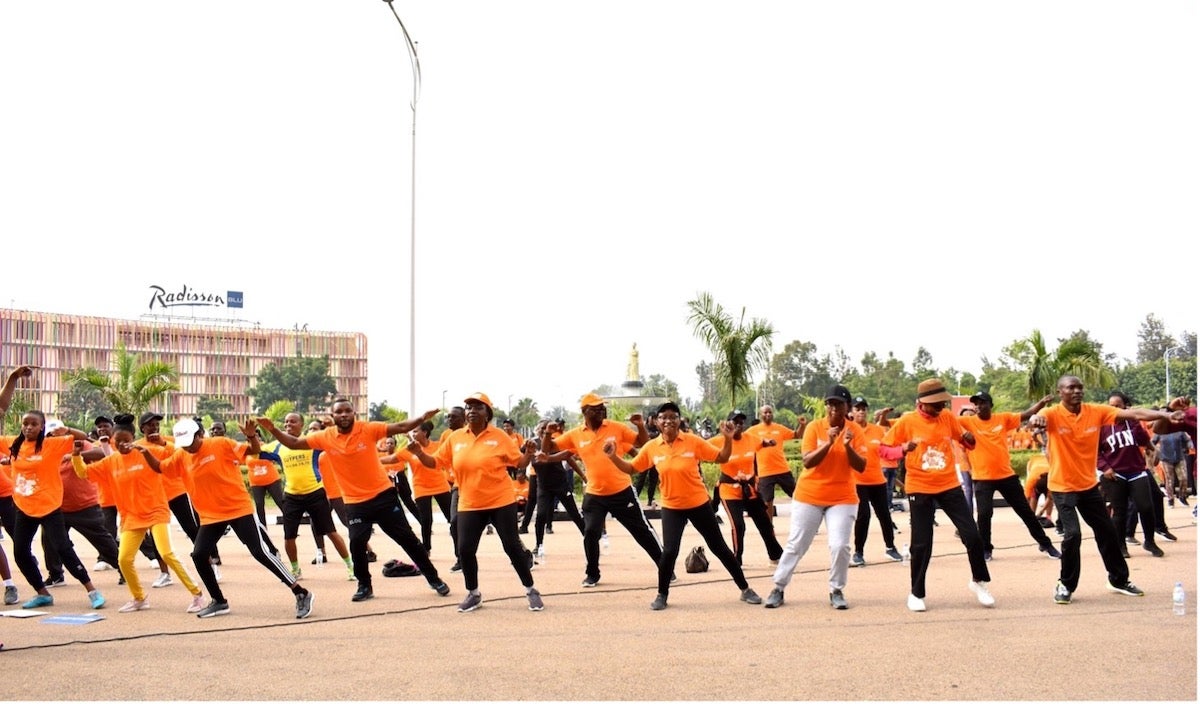
Speaking to participants of the ‘car free day’ sports activities, Hon. Prof. Bayisenge Jeannette, the Minister of Gender and Family Promotion requested all participants to collectively join in efforts to prevent and fight all forms of gender-based violence in their communities and in the workplaces, to build a violence-free society.
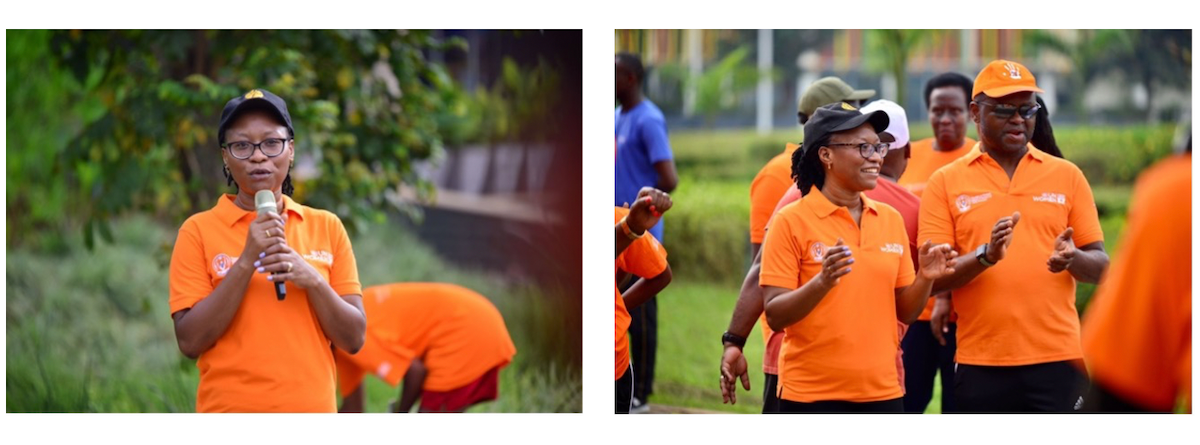
The car-free day sports activities brought different organizations together to run in solidarity of ending violence against GBV and have proved to be one of the good channels for reaching many people with clear messages.
Car-free day engagement on social media on 4 December 2022.
